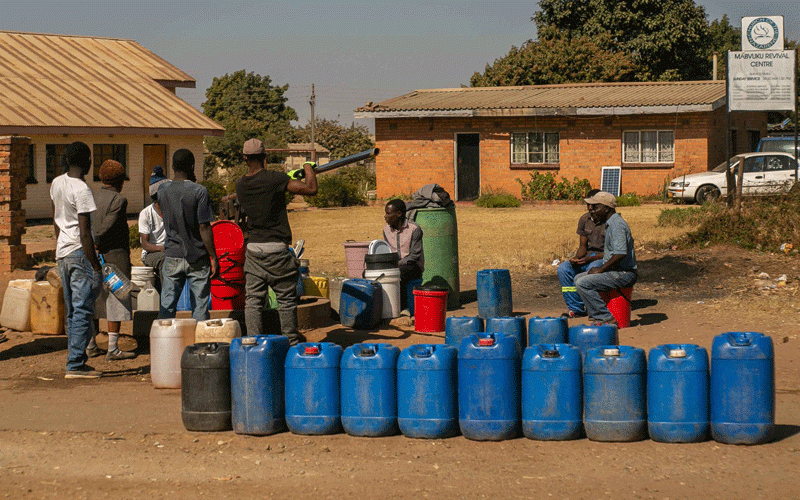
ON World Water Day, commemorated every year on March 22, Zimbabwe Lawyers for Human Rights (ZLHR) implores the Zimbabwean government to take tangible action to accelerate progress in ensuring access to safe drinking water and sanitation to more people and communities.
Since 1993, March 22 has been commemorated as World Water Day and this day offers opportunities to raise awareness and inspire action to tackle the water and sanitation crisis.
On World Water Day, governments, policymakers and other stakeholders commit to taking action to tackle the global water crisis affecting 2,2 billion people living without access to safe water.
The aptly chosen theme for World Water Day in 2023 — Accelerating Change — is pertinent to solving the worsening water and sanitation crisis.
Access to safely managed water and sanitation coupled with healthy hygiene practices and resources communities enjoy improved health, build resilient economies and offer greater opportunities for prosperity.
The right to safe water and sanitation is a gateway to the enjoyment of multiple other critical human rights and entitles everyone to sufficient, safe, clean, physically accessible and affordable water for personal and domestic use and consumption and ultimately sustains every person’s life.
While water and sanitation are basic needs critical for the survival of people, it is worrying that several people in the world estimated at 2,2 billion by the United Nations, lack access to safe and clean water and adequate sanitation.
This sad state of affairs puts in jeopardy the planned attainment of Sustainable Development Goal 6, which seeks to ensure the availability and sustainable management of water and sanitation for all by 2030.
- Hesitancy slows Covid vaccination for children
- Hesitancy slows Covid vaccination for children
- Multisectoral COVID-19 messaging campaign improving prevention and vaccine uptake in Zimbabwe
- Cultivate demand for Covid-19 vaccines
Keep Reading
Hence, this makes it imperative for governments to eliminate the inequalities and barriers to access to this vital resource.
ZLHR is gravely concerned by reports issued by the Health and Child Care ministry of an upsurge in cases of cholera in several parts of the country.
It is alarming that a medieval and preventable disease such as cholera continues to affect people in this day and age.
It is unacceptable that outbreaks of cholera and other waterborne diseases continue to be recorded in the country.
The Constitution places an obligation on the State to guarantee the rights of persons to safe, clean and potable water as enshrined in section 73 and the right to healthcare provided for in section 76 and hence government must uphold its obligations in the Governance Charter.
To accelerate change and secure a water-wise future, ZLHR implores both local and central government to:
Fulfil constitutional obligations to achieve the progressive realisation of the right to clean, safe and potable water, the right to health and the right to an environment that is not harmful to health;
Stop the recurrence of the outbreak of preventable diseases such as cholera and devise prevetive strategies for non-recurrence in the future including of other water-borne diseases like typhoid and diarrhoea;
Double efforts in providing and ensuring access to water and sanitation and increase budget allocation for water, sanitation and hygiene.
Invest in infrastructure and technologies that improve access to clean water;
Reduce water wastage and pollution and promote water conservation and efficiency;
Address the impact of climate change and invest in climate-resilient water infrastructure. -ZLHR
Impunity threatens impact of performance contracts
ON February 10, 2022, Cabinet ministers and heads of public institutions signed performance contracts which had their first evaluation, review and assessment recently.
Performance contracts are part of a strategic human resource management system, tailor-made to ensure organisational optimum efficiency by evaluating one’s performance against the agreed milestones in his or her contract.
Ideally, performance contracts are a welcome development as they project government’s positive attitude towards improving accountability in public service delivery.
However, in Zimbabwe, the potential positive impact of performance contracts is undermined by an unchecked culture of impunity among the political elite.
In this regard, apprehensive commentators view the contracts as an electoral “populism stance” aimed at recalibrating the regimes image with respect to public service delivery, accountability and transparency.
Only deep-seated reforms and tangible service delivery outcomes will make the electorate believe that the government is serious about getting senior public officials to deliver.
According to the performance assessments done, a total of 19 out of 21 ministers were evaluated.
Two of the ministers performed beyond expectation, while two others performed below set targets.
The remaining 15 are said to have successfully met their target.
Juxtaposing the positive evaluation of ministers’ performance vis-a-viz the quality of public service delivery across the country, indicates that, either public officials were given different milestones contrary to the improvement of service delivery or are being rewarded for failing dismally.
Service delivery across the country is in the doldrums amid decrepit and dilapidating infrastructure.
A looming cholera outbreak in a context with low ambulance coverage, poor water reticulation, drug and hospital bed shortage is a pressing cause for concern at a time when the health service is already failing to cope.
According to the United Nations Children’s Fund, over 1,9 million people are in urgent need of safe drinking water, sanitation and good hygiene.
The proposed mass public transport system has failed to materialise under strain of inefficiencies at Zupco and a broken road and rail infrastructure.
At the same time, electricity outages have become the order of the day, with communities going for more than 18 hours without electricity.
A negative implication to the business fraternity as it relies much on electricity for the operation of businesses.
Water woes continue to mount, approximately 60% of water sources in the country are unsafe, leaving most families at risk of diarrhoeal disease outbreaks.
The Lands, Agriculture, Fisheries, Climate and Rural Development ministry is one of the two ministries that surpassed set targets.
The vision of the ministry is “A prosperous, inclusive, diverse, sustainable and competitive agricultural sector by 2030” and its mission is “to facilitate the growth of a modern, sustainable and viable climate smart agricultural sector”.
There is, however, no prosperous, sustainable and competitive agricultural sector as the sector is mired in trade injustices which have kept poor farmers poor and millions of Zimbabweans food insecure.
In the tobacco, cotton and sugar industries, smallholder farmers are not given the same opportunities as the politically exposed persons and corporates.
Thus, they find it difficult to access lines of credit and fair remuneration for their produce. Currently, there are about 3,8 million rural people and 1,6 million urban people facing food insecurity.
Approximately, 4,8 million children are suffering from severe acute malnutrition a testament to inadequate food.
Therefore, one wonders which job well done is the Agriculture minister being thanked for when there is evidence of growing food insecurity and low productivity among almost 70% of the Zimbabwean population which depends on agriculture for livelihoods.
Performance management is an incremental paradigm shift from result-based management.
Thus, results of performance assessments must reflect objective evaluation and assessment not political affiliation or propaganda tailor-made to entice the electorate into voting for incumbents.
To this end, whatever measurement or standard used to assess the performance of ministers does not capture the reality on the ground.
Zimbabweans must be given an opportunity to contribute to the performance measurement framework and offer recommendations towards the attainment of the objectives of the National Development Strategy 1.-Zimcodd
Zim makes strides on environmental agreements
MULTILATERAL environmental agreements (MEAs) are legally binding international conventions and treaties signed with the objective to address common environmental challenges collectively.
Zimbabwe is a party to the United Nations Convention on Biological Diversity (CBD) and the Basel, Rotterdam and Stockholm (BRS) conventions.
The commitment to fulfil its obligations is demonstrated by its ambitious plan to mainstream biodiversity into agricultural policies and reduce the impact of pesticides.
The Food and Agriculture Organisation of the United Nations (FAO) and the Government of Zimbabwe, through the ministries responsible for agriculture and environment, embarked on a process to review the country’s progress and plan to accelerate the implementation of the CBD and BRS.
The reviewing and planning process was done under the European Union-funded project “Capacity Building Related to Multilateral Environmental Agreements in African, Caribbean and Pacific Countries Phase III (ACP-MEAs 3).”
The ACP-MEAs 3 programme is a strong fit within the strategic narrative guiding the FAO Strategic Framework on transformation to more efficient, inclusive, resilient and sustainable agri-food systems for better production, better nutrition, a better environment, and a better life, leaving no one behind.
In April 2021, Zimbabwe launched the ACP-MEAs 3 project to promote agricultural practices and activities that enhance the sustainability and resilience of agrobiodiversity and its associated agroecosystems.
The project promotes the management of biodiversity and its ecosystems, enhancing sustainable agricultural paradigms.
Significant progress has been made two years down the line while also acknowledging challenges and lessons learned along the way.
With one year of implementation remaining, the ACP-MEAs 3 Project Technical Unit (PTU) convened a review and planning meeting to set the pace for a sustainable project exit strategic plan.
The PTU discussed several measures to strengthen the integration of project activities into government institutions and programmes.
The PTU, co-chaired by the two ministries responsible for agriculture and environment, provides project oversight and co-ordination to ensure effective planning, management, monitoring and evaluation of inter- and intra-sectorial activities.
In line with the standing provisions of the PTU, the ACP-MEAs 3 convened its first PTU meeting in 2023 to take stock of progress and plan to execute the remaining activities under the project’s four thematic areas that is: policy development, research and development, highly hazardous pesticides and farmer field schools.
Zimbabwe is leading the development of an enabling policy environment to implement the MEAs in the agricultural sector.
Government is drafting the overarching agrobiodiversity policy framework to mainstream biodiversity into agricultural policies and practices. Under this framework, the government is developing the agroecology promotion strategy and action plan, the animal genetic resources strategy and action plan, and mainstreaming biodiversity into the provincial investment plans. - APO Group







